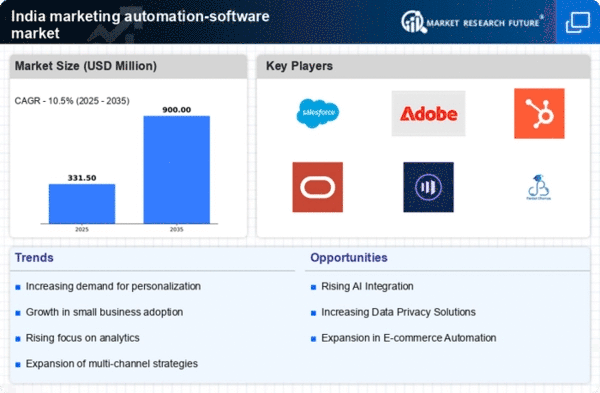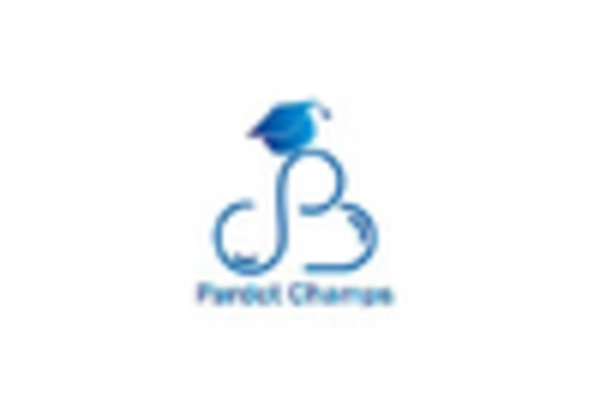Rising Demand for Personalization
The marketing automation-software market in India is experiencing a notable surge in demand for personalized marketing solutions. Businesses are increasingly recognizing the importance of tailoring their marketing efforts to meet individual customer preferences. This trend is driven by the growing availability of customer data and advanced analytics tools, which enable companies to create targeted campaigns. According to recent estimates, the personalization segment within the marketing automation-software market is projected to grow at a CAGR of approximately 25% over the next five years. As organizations strive to enhance customer engagement and loyalty, the need for sophisticated automation tools that facilitate personalized communication is becoming paramount.
Integration with E-commerce Platforms
The integration of marketing automation-software with e-commerce platforms is emerging as a critical driver in India. As online shopping continues to gain traction, businesses are seeking seamless solutions that connect their marketing efforts with sales channels. This integration allows for real-time data sharing, enabling marketers to optimize campaigns based on customer behavior and purchase history. The marketing automation-software market is witnessing a shift towards solutions that offer robust e-commerce capabilities, with a projected growth rate of 30% in this segment. Companies that leverage these integrated systems can enhance their marketing effectiveness and drive higher conversion rates.
Growing Adoption of Cloud-Based Solutions
The marketing automation-software market in India is experiencing a significant shift towards cloud-based solutions. Organizations are increasingly adopting cloud technologies due to their scalability, cost-effectiveness, and ease of access. This transition allows businesses to implement marketing automation tools without the need for extensive IT infrastructure. The cloud-based segment is projected to grow at a CAGR of 28% over the next few years, reflecting the growing preference for flexible and remote solutions. As companies seek to streamline their marketing operations, the demand for cloud-based automation software is likely to continue its upward trajectory.
Increased Focus on Analytics and Reporting
In the current landscape, the marketing automation-software market is witnessing an increased emphasis on analytics and reporting functionalities. Businesses are increasingly relying on data-driven insights to inform their marketing strategies. The ability to track campaign performance, customer engagement, and ROI is becoming essential for marketers. As a result, software solutions that offer advanced analytics capabilities are in high demand. Recent data suggests that the analytics segment within the marketing automation-software market is expected to grow by 20% in the coming years. This trend indicates a shift towards more informed decision-making processes, allowing companies to refine their marketing efforts effectively.
Emergence of Small and Medium Enterprises (SMEs)
The marketing automation-software market is witnessing a notable rise in adoption among small and medium enterprises (SMEs) in India. These businesses are increasingly recognizing the value of automation in enhancing their marketing efforts and improving operational efficiency. With the availability of affordable and user-friendly marketing automation tools, SMEs are now able to compete with larger organizations. Recent statistics indicate that the SME segment is expected to contribute significantly to the overall growth of the marketing automation-software market, with an anticipated increase of 35% in adoption rates over the next few years. This trend highlights the democratization of marketing technology, enabling SMEs to leverage sophisticated tools previously accessible only to larger firms.
















